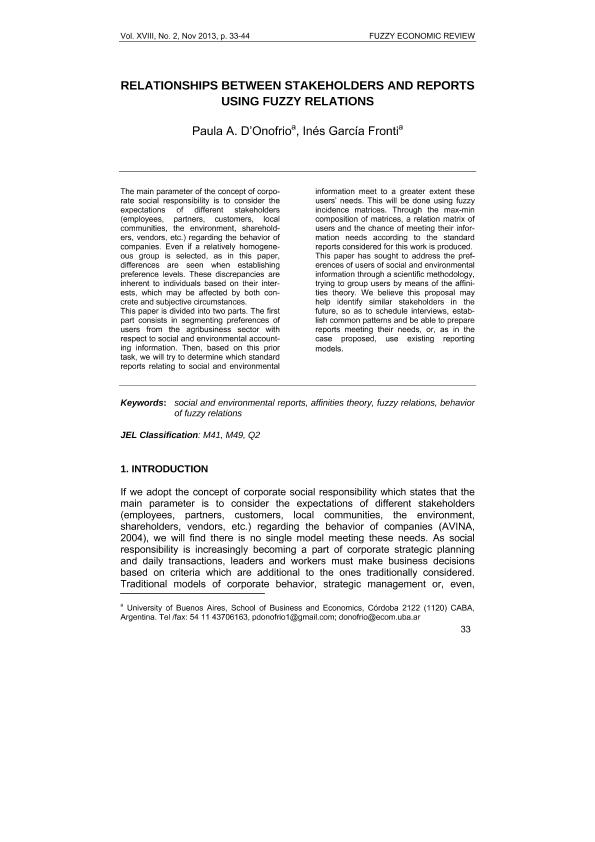Mostrar el registro sencillo del ítem
dc.contributor.author
D'onofrio, Paula
dc.contributor.author
Garcia Fronti, Ines Mercedes

dc.date.available
2017-05-31T21:00:37Z
dc.date.issued
2013-11
dc.identifier.citation
D'onofrio, Paula; Garcia Fronti, Ines Mercedes; Relationships between stakeholders and reports using Fuzzy relations; International Association for Fuzzy-set Management and Economy; Fuzzy Economic Review; XVIII; 2; 11-2013; 33-44
dc.identifier.issn
1136-0593
dc.identifier.uri
http://hdl.handle.net/11336/17225
dc.description.abstract
The main parameter of the concept of corporate social responsibility is to consider the expectations of different stakeholders (employees, partners, customers, local communities, the environment, shareholders, vendors, etc.) regarding the behavior of companies. Even if a relatively homogeneous group is selected, as in this paper, differences are seen when establishing preference levels. These discrepancies are inherent to individuals based on their interests, which may be affected by both concrete and subjective circumstances. This paper is divided into two parts. The first part consists in segmenting preferences of users from the agribusiness sector with respect to social and environmental accounting information. Then, based on this prior task, we will try to determine which standard reports relating to social and environmental information meet to a greater extent these users’ needs. This will be done using fuzzy incidence matrices. Through the max-min composition of matrices, a relation matrix of users and the chance of meeting their information needs according to the standard reports considered for this work is produced. This paper has sought to address the preferences of users of social and environmental information through a scientific methodology, trying to group users by means of the affinities theory. We believe this proposal may help identify similar stakeholders in the future, so as to schedule interviews, establish common patterns and be able to prepare reports meeting their needs, or, as in the case proposed, use existing reporting models.
dc.format
application/pdf
dc.language.iso
eng
dc.publisher
International Association for Fuzzy-set Management and Economy
dc.rights
info:eu-repo/semantics/openAccess
dc.rights.uri
https://creativecommons.org/licenses/by-nc-sa/2.5/ar/
dc.subject
Social And Environmental Reports
dc.subject
Affinities Theory
dc.subject
Fuzzy Relations
dc.subject
Behavior of Fuzzy Relations
dc.subject.classification
Otras Ciencias Sociales

dc.subject.classification
Otras Ciencias Sociales

dc.subject.classification
CIENCIAS SOCIALES

dc.subject.classification
Otras Ciencias Sociales

dc.subject.classification
Otras Ciencias Sociales

dc.subject.classification
CIENCIAS SOCIALES

dc.title
Relationships between stakeholders and reports using Fuzzy relations
dc.type
info:eu-repo/semantics/article
dc.type
info:ar-repo/semantics/artículo
dc.type
info:eu-repo/semantics/publishedVersion
dc.date.updated
2017-05-19T18:28:14Z
dc.journal.volume
XVIII
dc.journal.number
2
dc.journal.pagination
33-44
dc.journal.pais
España

dc.description.fil
Fil: D'onofrio, Paula. Universidad de Buenos Aires; Argentina
dc.description.fil
Fil: Garcia Fronti, Ines Mercedes. Consejo Nacional de Investigaciones Científicas y Técnicas. Oficina de Coordinación Administrativa Saavedra 15. Instituto Interdisciplinario de Economía Politica de Buenos Aires. Universidad de Buenos Aires. Facultad de Ciencias Económicas. Instituto Interdisciplinario de Economía Politica de Buenos Aires; Argentina
dc.journal.title
Fuzzy Economic Review
dc.relation.alternativeid
info:eu-repo/semantics/altIdentifier/url/http://www.sigef.net/component/k2/item/539-relationships-between-stakeholders-and-reports-using-fuzzy-relations
Archivos asociados
